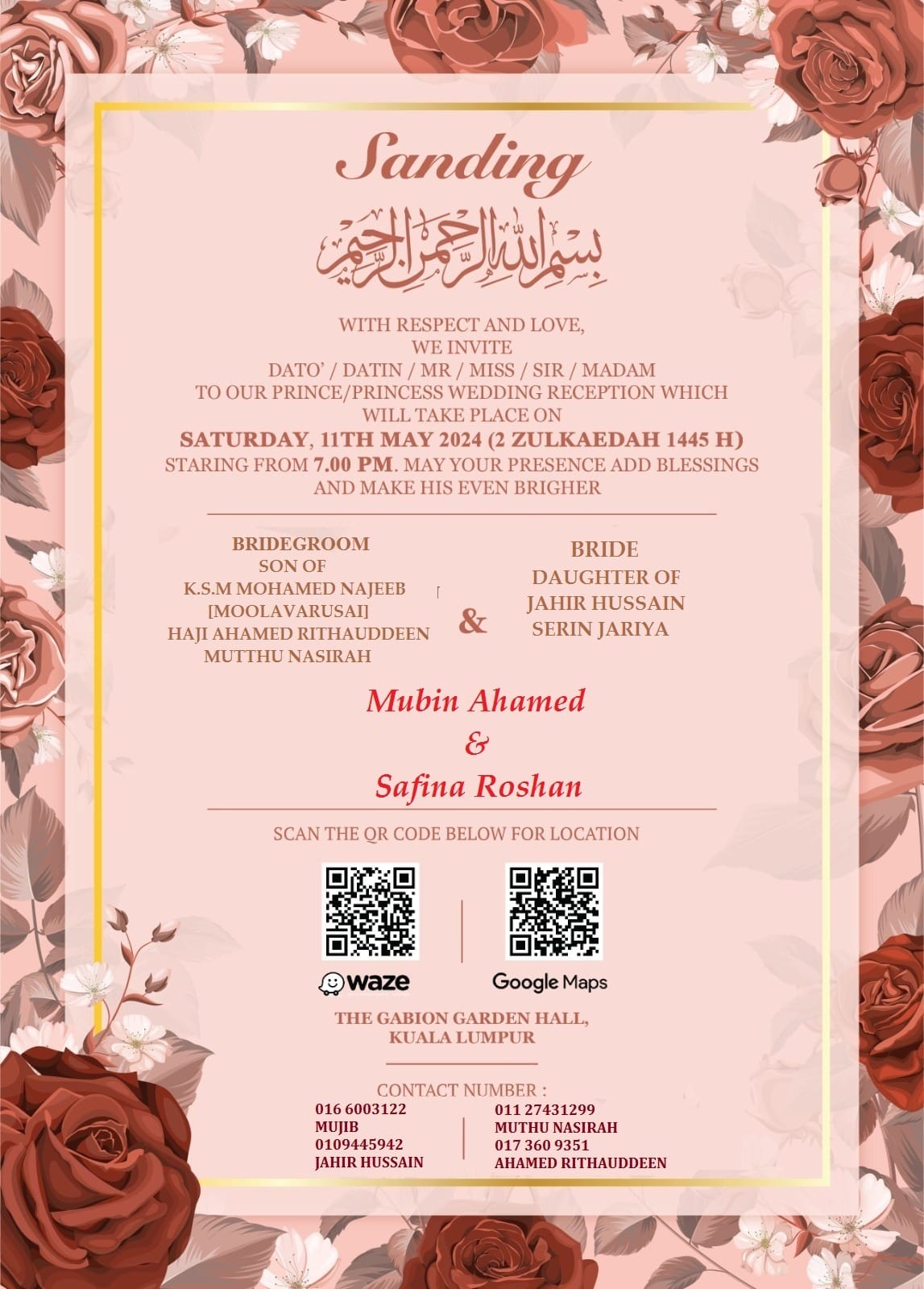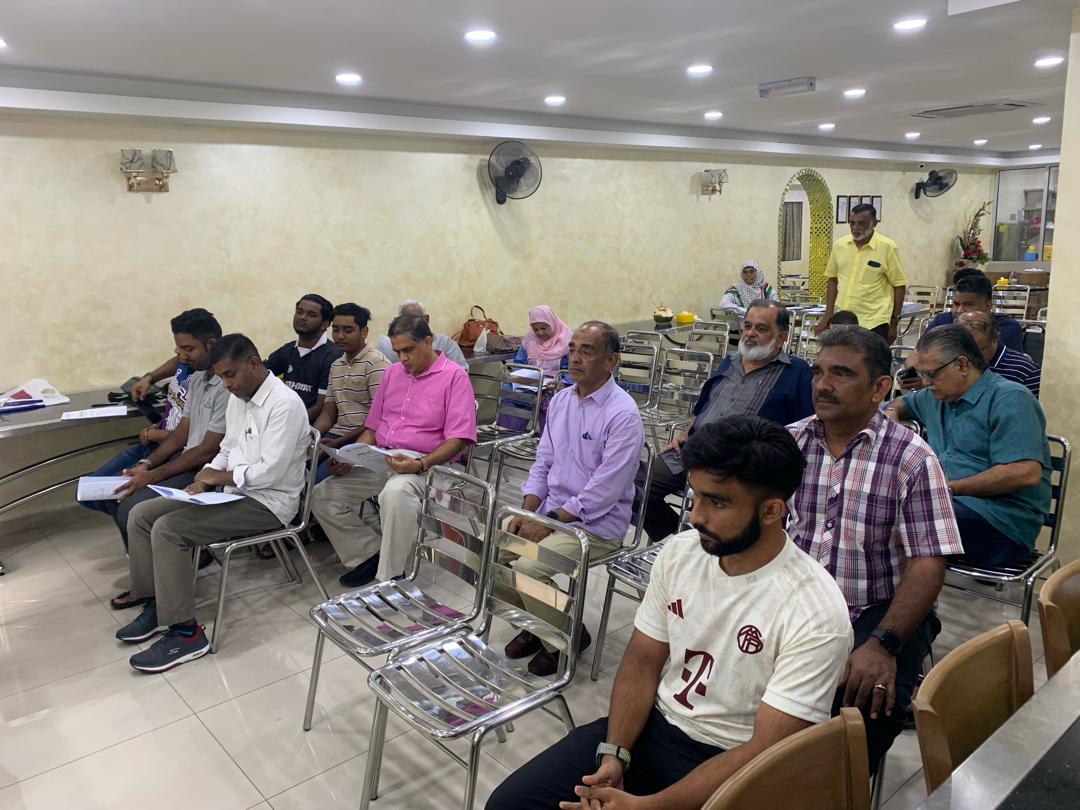ETIQUETTE OF NAMING CHILDREN
- WEDDINGS & EVENTS
- ETIQUETTE OF NAMING CHILDREN
ETIQUETTE OF NAMING CHILDREN
Assalamu’alaikum, all Alagai Makkal,
There was a new arrival in my family on 02/10/2010,Alhamdulillah. We were blessed with our first grand-son. We thanked our son and marumagal for promoting us to atthamma and raathattha and all praises to Allah….
Etiquette of naming children :
Allah encompasses all of His creation with His care, blessings, generosity and kindness. Allaah is the Self-Sufficient Whose provision is sufficient for all of His creatures. There is no one who does not eat from His provision; no one is able to eat from anything other than His provision. His Mercy encompasses all things and He fulfils every need. He is the One Who gives much; He has sufficient means to respond to the requests of all, and He encompasses all things as He says (interpretation of the meaning):
“All things He comprehends in His knowledge” …….. [Ta-Ha 20:98 – Yusuf ‘Ali’s translation of the meaning]
No doubt the matter of giving names is one of the most important issues in people’s lives, because a person’s name is a title which says something about him, and is essential for communicating with him. It is an adornment and symbol for the person, by which he is called in this world and in the Hereafter. It is indicative of the religion to which he belongs, and makes him feel that he is one of the followers of that religion. It gives an impression of him to other people, and in their view it is like a garment – if it is too long or too short, it does not look right.
The basic principle concerning names is that they are permissible, but there are some matters which are prohibited according to sharee’ah and should be avoided when choosing names. These include the following:
– Enslavement to or worship of anything other than Allah, including Prophets and angels. It is not permissible to be enslaved to or to worship anyone or anything other than Allah at all. Among the names which express enslavement to or worship of anything other than Allah are ‘Abd al-Rasool (“slave of the Messenger”), ‘Abd al-Nabi (“slave of the Prophet”) and ‘Abd al-Ameer (slave of the prince) and other names which imply worship of or submission to anything other than Allah. The person who has a name like this must change it. The great Sahaabi ‘Abd al-Rahmaan ibn ‘Awf (may Allah be pleased with him) said: My name was ‘Abd ‘Amr – or according to one report, ‘Abd al-Ka’bah – and when I became Muslim, the Messenger of Allah (peace and blessings of Allah be upon him) called me ‘Abd al-Rahmaan. (Narrated by al-Haakim, 3/306. Al-Dhahabi agreed with him)
– Names of Allah which are befitting only for Him, may He be glorified, such as al-Khaaliq (the Creator), al-Raaziq (the Provider), al-Rabb (the Lord), al-Rahmaan (the Most Merciful), etc., which are names that befit only Allah; names which describe attributes which are true only of Allah, such as Malik al-Mulook (King of kings), al-Qaahir (the Subduer), etc. It is haraam to call people by these names, and they must be changed. Allah says (interpretation of the meaning): “Do you know of any who is similar to Him?” [Maryam 19:65].
– Names that belong exclusively to the kuffaar and are not used by anyone else, such as ‘Abd al-Maseeh (“slave of the Messiah”), Butrous (Peter), Jurjus (George), and other names which denote religions of kufr.
– Names of idols and false gods which are worshipped instead of Allah, such as naming someone after a devil and so on.
It is not permissible to call people after the names referred to above; indeed, doing so is haraam and anyone who has such a name is obliged to change it.
– It is makrooh (disliked) to use names which have off-putting meanings, either because the meaning is ugly or because it will provoke others to make fun of the person. Such names also go against the teaching of the Prophet (peace and blessings of Allah be upon him), who commanded us to give beautiful names. Examples of such (objectionable) names include Harb (“war”), Rashaash (sprinkles or drizzle), and Hiyaam – which is the name of a disease suffered by camels – and other names which have ugly or unpleasant meanings.
– It is makrooh to use names which have alluring or provocative meanings. This happens a lot when it comes to naming girls, where some names are given which have sexual or provocative meanings.
– It is makrooh to deliberately name someone after immoral people such as singers and actors/actresses, etc. If they have good names, it is permissible to use those names, but it must be because of the meaning of the name and not because of the desire to imitate those people.
-I It is makrooh to give names which have meanings that refer to sin, such as Saariq (“thief”) or Zaalim (“wrongdoer”); or to give the names of Pharaohs or sinners, such as Fir’awn (Pharaoh), Haamaan (the name of Pharaoh’s minister) and Qaaroon.
– It is makrooh to use the names of animals which are well-known for their undesirable characteristics, such as al-Himaar (donkey), al-Kalb (dog), al-Qird (monkey), etc.
.
– It is makrooh to use any name which is added to the words “al-Deen” or “al-Islam” (i.e., names which appear in idaafah – genitive construction – with these words), such as Noor al-Deen (“light of the religion”), Shams al-Deen (“sun of the religion”), Noor al-Islam (“light of Islam”), Shams al-Islam (“sun of Islam”), etc., because these names give a person more than he deserves. The scholars of the Salaf disliked being given nicknames of this sort. Imaam al-Nawawi (may Allah have mercy on him) disliked his nickname of Muhiy al-Deen (“reviver of the religion”); Shaykh al-Islam Ibn Taymiyah (may Allah have mercy on him) also disliked his nickname of Taqiy al-Deen (“piety of the religion”), and he used to say, “But my family gave me this nickname and it became well-known.”
– It is makrooh to add any word to the name of Allaah except the word ‘Abd (slave), as in ‘Abd-Allaah (Abdullah). Example of this include Hasab-Allah, Rahmat-Allaah (the mercy of Allah), etc. It is similarly makrooh to add words to the word al-Rasool (the Messenger).
– It is makrooh to use the names of angels, or to call people after the names of soorahs in the Qur’aan, such as Ta-Ha, Yaa-Seen, etc. These names are al-Huroof al-Muqatta’ah (letters which appear at the beginning of some soorahs; their meaning is known only to Allah – Translator), they are not names of the Prophet (peace and blessings of Allah be upon him). See Tuhfat al-Mawdood by Ibn al-Qayyim (may Allah have mercy on him), p 109.
These names are makrooh, and it is makrooh to give them to anyone. But if a person has been given such a name by his family, and he is grown up and it is difficult for him to change it, he does not have to do so.
There are four categories of good names:
The first (best) category is the names ‘Abd-Allah and ‘Abd al-Rahmaan. It was reported that the Prophet (peace and blessings of Allah be upon him) said: “The most beloved of names to Allah are ‘Abd-Allah and ‘Abd al-Rahmaan.” (Narrated by Muslim in his Saheeh, 1398).
The second category is all the names which express enslavement to and worship of Allah, such as ‘Abd al-Azeez, ‘Abd al-Raheem, ‘Abd al-Malik, ‘Abd al-Ilaah, ‘Abd al-Salaam, etc.
The third category is the names of Prophets and Messengers – may the peace and blessings of Allah be upon them. Undoubtedly the best and greatest of them is our Prophet Muhammad (peace and blessings of Allah be upon him); the name Ahmad is also one of his names. Next come the names of the “Messengers of strong will” [cf. Al-Ahqaaf 46:35], namely Ibraaheem, Moosa, ‘Eesa and Nooh (may the peace and blessings of Allah be upon them), then the rest of the Prophets – may the peace and blessings of Allah be upon them.
The fourth category is the names of righteous slaves of Allah, above all the companions of our noble Prophet. It is mustahab to use their names, following their example and hoping to reach a higher status.
The fifth category is any other good name which has a proper and pleasant meaning.
It is good to pay attention to a number of matters when giving names to our children, including the following:
1. Recognizing the fact that this name will stay with the person for his entire lifetime, and it could cause some embarrassment or problems for him which in turn could make him feel badly towards his father, mother or whoever gave him this name.
2. 2 . When looking at names in order to choose one, we should look at it from a number of angles. We should look at the name itself, and also think of how it will sound when this person is a child, a youth, an adult, an old man and a father, and how it will suit his father to be called “Abu” (Father of) So and so, and how it will suit his son to be called Son and so son of So and so, etc.
3. 3 . Choosing the name is the right of the father, because he is the one after whom the child will be named (son of, or daughter of…). But it is mustahabb for the father to involve the mother in the decision and to ask for her opinion as to whether she thinks the name is good, so that she will feel happy.
4. The child must be named after his father even if the father is deceased or divorced, etc., even if he does not take care of the child or see him at all. It is utterly haraam to name a child after anyone other than his father, except in one case, which is when the child is born as the result of adultery (Allaah forbid). In this case the child should be named after his mother and it is not permissible to name him after his father.
Allah is the One Whose attributes are immense, as is all that is connected to them. No one can praise Him sufficiently; He is as He has praised Himself. His might, power and dominion are vast, and He is Great in bounty and goodness, and Most Generous.
Shaykh ‘Abd al-‘Azeez ibn Baaz was asked about the soundness of the hadeeth, “Whoever is called Muhammad should not be beaten or insulted.” …….. He said: This hadeeth is fabricated and falsely attributed to the Messenger of Allah (peace and blessings of Allah be upon him), and it has no basis in the pure Sunnah. The same applies to the saying, “Whoever is called Muhammad under the protection of Muhammad and his name will bring him close to Paradise.” The same applies to those who say, “Whoever is called Muhammad his household will have such and such…” All of these reports have no sound basis. What matters is following Muhammad (peace and blessings of Allah be upon him), not being called by his name. How many of those who are called Muhammad are evil, because they do not follow Muhammad or implement his sharee’ah. Names do not purify people; what purifies them is their righteous deeds and their fear of Allah. So whoever is called Ahmad or Muhammad or Abu’l-Qaasim and is a kaafir or an evildoer will not benefit from his name. Rather what each person must do is fear Allah and strive to obey Allah and adhere to the sharee’ah of Allah with which He sent His Prophet Muhammad. This is what will benefit him, and this is the way to salvation. As for names without acting in accordance with sharee’ah, they have nothing to do with salvation or punishment. …… Majmoo’ Fataawa al-Shaykh Ibn Baaz, 6/370.
We ask Allah to guide us all , Ameen ! Ameen !Yarabbil Aalameen !!!
Categories
Events
Blog Archieve
- [+] 2024 (2)
- [+] 2023 (2)
- [+] 2021 (2)
- [+] 2020 (8)
- [+] 2019 (5)
- [+] 2018 (5)
- [+] 2017 (4)
- [+] 2016 (16)
- [+] 2015 (42)
- [+] 2014 (36)
- [+] 2013 (15)
- [+] 2012 (19)
-
[+]
2011 (61)
- [+] January (7)
- [+] February (7)
- [+] March (4)
- [+] April (1)
- [+] May (5)
- [+] June (1)
- [+]
July
(8)
- Kem Ibadah Wanita Pra-Ramadhan
- Invitation to Majlis Berbuka Puasa MAMJ
- Majlis Berbuka Puasa MAMJ 2011
- Ramadhan 2011 Fund
- Another Achievement by Our Past President Haji Mohamed Ismail Sharif – He is Among the Top 50 Islamic Finance Lawyers Globally. Alhamdulillah
- பட்டமளிப்பு விழா
- Majlis Buka Puasa Amal 2011 – Anjuran Indiamuslim.org (IM.ORG) Dengan Usahasama Muslim Manaver Sanggam (MMS)
- Chess tournament
- [+]
August
(9)
- ALL RELIGIONS SAY ‘ONE’ – Part 2 (In Hinduism, Sikhism, Christianity, Judaism, Confucianism & Buddhism)
- ALL RELIGIONS SAY ‘ONE’ – Introduction
- PENYERTAAN PAS DALAM PERARAKAN BERSIH 2.0
- BAN ON RECITAL OF THE QURAN OVER LOUDSPEAKERS IN PENANG
- MY VIEW ON MARISA DEMORI’S LETTER IN NEW STRAITS TIMES
- THE ISSUE OF MURTAD (APOSTASY)
- ALAGAI PATTAMALIPPU VIZHA
- THANK YOU MAMJ MEMBERS
- RAMADHAN MUBARAKH!!!!!
- [+] September (5)
- [+] Octobar (4)
- [+] November (3)
- [+] December (7)
-
[+]
2010 (160)
- [+] January (8)
- [+] February (3)
- [+] March (1)
- [+] April (3)
- [+] June (1)
- [+]
July
(15)
- ஜோதிடம் , சகுனம் பார்த்தல் : இஸ்லாமியக் கண்ணோட்டம்
- OUR PRESIDENT AND DATIN VISIT DR.APJ ABDUL KALAM
- உம்மத்தின் வழிமுறை
- IBUBAPA
- The Key to Raising Righteous and Successful Children
- ங்கள், செலவழிக்கும் முன் சம்பாதியுங்கள்
- A New Domain Extension “.CO” Launched
- தாம்பத்திய உறவு
- கமலாதாஸ் – ஸுரையா :
- உறவுக்கு அப்பால் தாய் தந்தை
- PERIYAR DASAN’S SPEECH AT JEDDAH:PHOTOS
- பெண்ணுரிமையும்! இன்றைய பெண்களும்!!
- FAMILY VALUES : THE MOTHER
- Invitation to Program Rapat 1Malaysia
- Just See What British Thought of India and How They Managed to Rule Us
- [+]
August
(19)
- ALLAH THE GREATEST
- RAMADHAN : MONTH OF PATIENCE
- My Mother, My Best Friend
- RAMADHAN : MONTH OF PATIENCE
- Enriching the Community
- ZAKAT DISTRIBUTION
- 6-Story Jesus Statue Struck By Lightning!!!
- இல்லறமே நல்லறம்!!!
- வரதட்சணை : பூனைக்கு மணி கட்டுவது யார்?
- Dato’ Haji Thasleem and Datin Dr.Yazmeen with Dr. APJ Abdul Kalam
- அமைதியை இழந்து தவிக்கும் அமெரிக்க வீரர்கள்!
- WE ARE THE HONORABLE WOMEN OF ISLAM!
- Recent Archaeological find by Aramco During Gas Exploration in Saudi Arabia- Subhanallah
- ஒரு சகோதரியின் உலக சாதனை !
- BELOVED AMMA & ATTHA
- எதை கொடுப்பது ? எதை எடுப்பது?
- திருமணம் என்பது ஒவ்வொரு மனிதனில் வாழ்விலும் ஒரு முக்கியமான அம்சம்.
- முஸ்லிம்களுக்கு ஏன் இவ்வளவு பெருமை என்று வியந்தேன்…
- ஏன் இஸ்லாம் — ஆமினா அசில்மி
- [+]
September
(21)
- A Police Officer Wrote This! Please Read coz may Save your Life!
- Al-Quran
- APPEAL FOR LAND BY MAMJ
- History Mystery – Interesting and Incredible
- Makkah (SubahanAllah) -Current Development
- Prophet Muhammad SAW Praised by Non-Muslim Leaders and Philosophers
- Interactive Sites on Medical Information
- Indraiya Poluthu Iniya Poluthaaga Amaiyattum
- BABRI MASJID CASE -JUDGEMENT ON 24TH.SEPTEMBER 2010
- நபி மொழிகள் !!!
- The Minor Signs of the Last Day
- அல்லாஹ்விடம் உதவி தேடுங்கள்!
- Walking Helps Keep Body and Brain Young
- NY imam says mosque fight worth the controversy
- BELOVED ATTHA : YOU ARE THE BEST
- ஒரு குத்துச்சண்டை வீரரின் அழுகை!
- Ahmedabad’s Bus System a Hit with Several Countries
- Breaking News-RAMADHAN FUND 1431H
- All for a Palm Tree in Jannah
- MAMJ President at The Orphanage in Kg.Manjoi Ipoh
- MAMJ President at Buka Puasa Organised by Tanjung Muslim Association Penang in Association with Penang Hindu Sangam and Klinik Derma Sivasanta
- [+]
Octobar
(34)
- The Human Camera
- Outstanding Animations
- Best Signpost in India
- காய்கறிகள் பழங்கள் மூலமாக இருதய அடைப்பை நீக்க முடியுமா ?
- Better to be Lion Hearted!
- Peace of Mind Tips and Advice
- சில பொன்மொழிகள்..
- India’s Rare Pictures
- Home of a Mexican Drug Lord being raided!
- What is I C E ?
- Life iN the Year 3000
- GEMS OF WISDOM
- Regular Health Mistakes
- மகிழ்ச்சியாக இருப்பதற்குக் காரணங்கள் தேவை இல்லை
- Existence of Allah
- TO ALL AMMA’S : IMPORTANCE OF BREASTFEEDING
- ஆரோக்கியமாக வாழ ..
- Brain Damaging Food and Habits
- The status of the family in Islam
- Allah looks to your Heart & Deeds
- Shine a Light and enjoy your Coffee
- Be Very Careful of Rat Urine/Droppings
- THE PAST IS GONE FOREVER!!!!
- Taxi in Dubai
- Coincidental! – Good for Your Health
- ALLAHU AKHBAR!!
- The First Medical Council in The World
- Inside Ka’bah & Airmata Rasulullah SAW
- A Muslim Student in India Fights for Her Right to Dress in Islamic Way
- The Best Person in The History of Mankind
- FABULOUS COMPILATION
- ETIQUETTE OF NAMING CHILDREN
- Islam Again in Ayodya
- Interview with British Journalist Yvonne Ridley
- [+]
November
(38)
- Suhas Gopinath from Bangaluru,WORLD’S YOUNGEST CEO
- IF YOU HAVE A WILL, YOU WILL!!!!
- DISIPLIN ANAK-ANAK!!
- BE READY!!!!!!!!!!!!!
- REMEMBER! REMEMBER! REMEMBER!
- 360 DEGREE PICTURE – THE COCKPIT OF THE AIRBUS A380
- Allah takes Your Soul When You sleep
- 16 Amazing Photos that captured the world
- Be Amazed By The Beauty Of Nature
- MAMJ Presidents Speech at Masjid Muslim India Ipoh
- A Story of Appreciation
- Mirror or 2-Way Glass? BE CAREFUL
- God’s Work
- English is a Funny Language
- Hari Raya Aidiladha Wishes
- Superb Sentences By Famous People
- Dont Be Serious, Be Sincere
- Eating Fruits The Proper Way
- MUSLIM MOROCCANS LIVEHOOD
- Tony Blair’s sister-in-law Lauren Booth converts to Islam
- Success dosen’t come within a day! – MAMJ n Alagai Makkal
- பெண்
- THE SMALLEST GIRL IN THE WORLD!!!!!
- கோபம் – வேண்டவே வேண்டாம் !!!
- FED UP OF LIFE?
- SOCIAL CLASSES IN ISLAM???
- The Charles Schulz Philosophy
- ஆசைகளை சீர்படுத்துங்கள்
- ஆசைகளை முறைப்படுத்துங்கள்
- CWG 2010 Special – PHOTOGRAPHY
- Sejda Miracle
- Wedding Dates -Avoid Clash of Dates
- New Drug in Schools? Parents Please Take Note
- DEATH SENTENCE FOR A KIDNAPPER IN YEMEN
- AMAZING TRAIN ROUTES
- RICH INDIA? POOR INDIA? DO YOU BELEIVE THIS?
- One Call (ESTAWOO = Arrange yourselves) and The Impossible Happens
- To All Parents!
- [+]
December
(17)
- 14 YEARS OLD MOHAMED SUHAIL’S ACHIEVEMENTS:
- CONGRATULATIONS TO ALL MAMJ STUDENTS WHO SUCCEEDED IN PMR
- Notification of Wedding Dates
- Benefits of Drumstick leaves ( Tamil – Murungai leaves )
- Small teaser for Alagai Makkal..Enjoy!
- Niagara Falls 99 years ago. Worth Looking At
- 4 THINGS YOU PROBABLY NEVER KNEW YOUR MOBILE PHONE COULD DO
- ALAGANKULAM BIRDS SANCTUARY
- The Goodthings of HONEY
- The Ugly Briton
- The Cucumber
- Naive, Dim-wit or Extreme?
- Worth reading!
- Unconditional Love
- Muharram Message
- Muharram Greetings
- Amazing Houses Around the World – General Knowledge for Alagai Makkal
-
[+]
2009 (20)
- [+] September (2)
- [+] Octobar (3)
- [+] November (4)
- [+]
December
(11)
- Islam and Science
- Speak more in Malay -Dr. M Tells Indian Muslim
- Annual tax filing for YA 2009 – are we ready
- Divorce?! Separated!? Why?
- Wearing hijab – Compulsion, option or willingness?
- MAMJ EXCO MEET THE MEMBERS AT SUNGAI PETANI
- DINNER AND GIFT PRESENTATION TO EXCO MEMBERS 2006 – 2009
- Newspaper Clippings from India
- Eid al-Adha and Hajj 2009
- Thoughts to Share
- 2009 MAMJ Imam Al-Ghazzali Merit Awardees
- [+] 1996 (1)
- [+] 1993 (1)
- [+] 1881 (1)
-
[+]
0 (1)
Advertisement
Newsletter Sign Up
For Latest Updates




